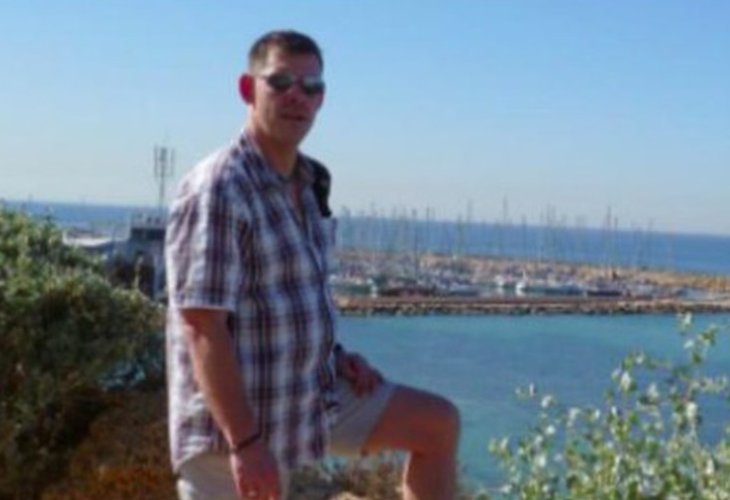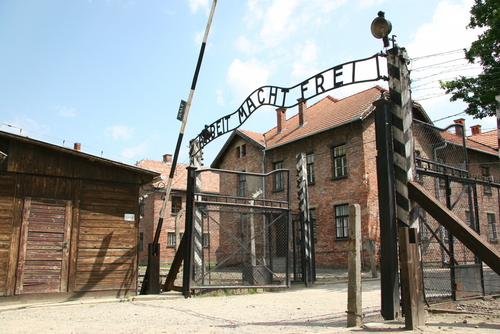Grandson of Rudolf Höss, Commandant of Auschwitz: "If I Met Him Today, I Would Kill Him"
Nothing prepared the Israeli youth delegation visiting Auschwitz for the pivotal meeting with Reiner Höss, the grandson of Rudolf Höss, the Auschwitz camp commander. The villa of the ruthless Nazi tyrant Höss was located adjacent to the camp, shedding light on why his grandson was obsessed with the extermination site. "If I met him today, I would kill him," he remarked.
 Reiner Höss today (Photo: From Twitter)
Reiner Höss today (Photo: From Twitter)Nothing prepared the Israeli youth delegation visiting Auschwitz for the pivotal meeting with Reiner Höss, the grandson of Rudolf Höss, the Auschwitz camp commander. The villa of the ruthless Nazi tyrant Höss was located adjacent to the camp, shedding light on why his grandson was obsessed with the extermination site. Seeking to hear more and more testimonies, to learn more about the suffering the Jews endured here, not to gloat over them. "I can't forgive him for the burden he brought to our lives," the grandson Höss expressed in an interview with the British newspaper 'The Telegraph'. "We had to carry a very heavy cross throughout our lives."
Suddenly, Reiner Höss pulls an old and worn photograph from his pocket. A small child gazes from it, standing against the background of the famous Auschwitz camp gate, with the inscription "Work sets you free". Nothing prepared this child for the truths he was about to discover regarding the camp with the 'innocent' gate in the picture.
Höss strolls with the Israeli students delegation at the museum established there, pausing to observe the pile of shoes of those who are no more. Countless shoes of children, adults, and toddlers—murdered and slaughtered with extreme agony merely because they were Jews.
"With us here is the grandson of the camp commander, Reiner Höss," suddenly broke the silence, the voice of the Israeli guide accompanying the delegation. "Who wants to ask him a question?"

Höss stands before the young ones with a poker face, waiting for questions. A young girl stands first, trying to ask but bursts into uncontrollable tears and leaves the room. Höss remains silent. After her, a boy stands and asks: "If you met your grandfather today, what would you do?"
"I would kill him," Höss sprays, with a facial expression speaking of disgust and hatred.
About his cruel grandfather's past, Höss discovered 'by chance'—no less, by a Holocaust survivor. "My father forced me and my mother to idolize Rudolf, and until the age of 12, I had no idea he was one of the greatest criminals in human history," he recounts. "Father compelled us to regard him as a hero, and every time we tried to rebel, father would punish us. At home, there was a dictatorship, and we were not allowed to disagree with my father's opinion."
On the first visit to Auschwitz: "The night before, I couldn't sleep"
Then caught stealing food from the school kitchen, along with friends—as punishment, the school principal decided to send him to work in the school garden. Unfortunately, the one managing the school garden was a Holocaust survivor who survived the Auschwitz camp, and once he realized he was dealing with the grandson of the camp commander himself, he seized the opportunity and did not miss it. According to Höss, he would beat him at every opportunity, claiming he didn't work well enough.
This situation lasted for three months, until the boy decided to tell one of the teachers, and then he was revealed to the bitter truth about his grandfather and the horrific crimes he committed against the camp's prisoners (just for some context, Höss ordered his subordinates to execute 20,000 people daily before retiring for an afternoon nap at his villa).
At the age of 16, when he could no longer endure the dictatorship at home on one hand and the stories he heard about his grandfather on the other—he decided to leave home and cut ties with all his family members who call him a 'traitor'. For years he pondered whether and how to visit the Auschwitz extermination camp, and only in 2009, with his mother and a couple of journalists documenting the event—he dared to visit. "I will never forget this visit," he later stated. "The night before, I couldn't sleep. I wandered back and forth in the room. Initially, I looked for excuses not to go there, but curiosity overcame them. I wanted to see for myself and feel Auschwitz—although the journey there was difficult and frightening."
After visiting Auschwitz, the decision made in his heart: to become active against the extreme right and neo-Nazi movements in Germany. As part of this activity, Höss visits about 70 schools in Germany annually, where he gives lectures on racism, talks about the Holocaust and the many victims who were murdered for no fault of their own—by none other than his grandfather. "I don't miss any opportunity to fight extremist right-wing organizations, and I'm not afraid of them at all. All the far-right parties are just like the Nazis," he says today.
"Their ideology is identical, and they use horrific expressions to convince the young generation that minorities are stealing jobs. Just like the Nazis did to the Jews, only now they're not speaking just about Jews but about a much larger target. They spread their hatred in quiet ways. These movements are much more organized than Hitler's Nazi Germany, and I think other countries have learned nothing from the past," he concluded.

